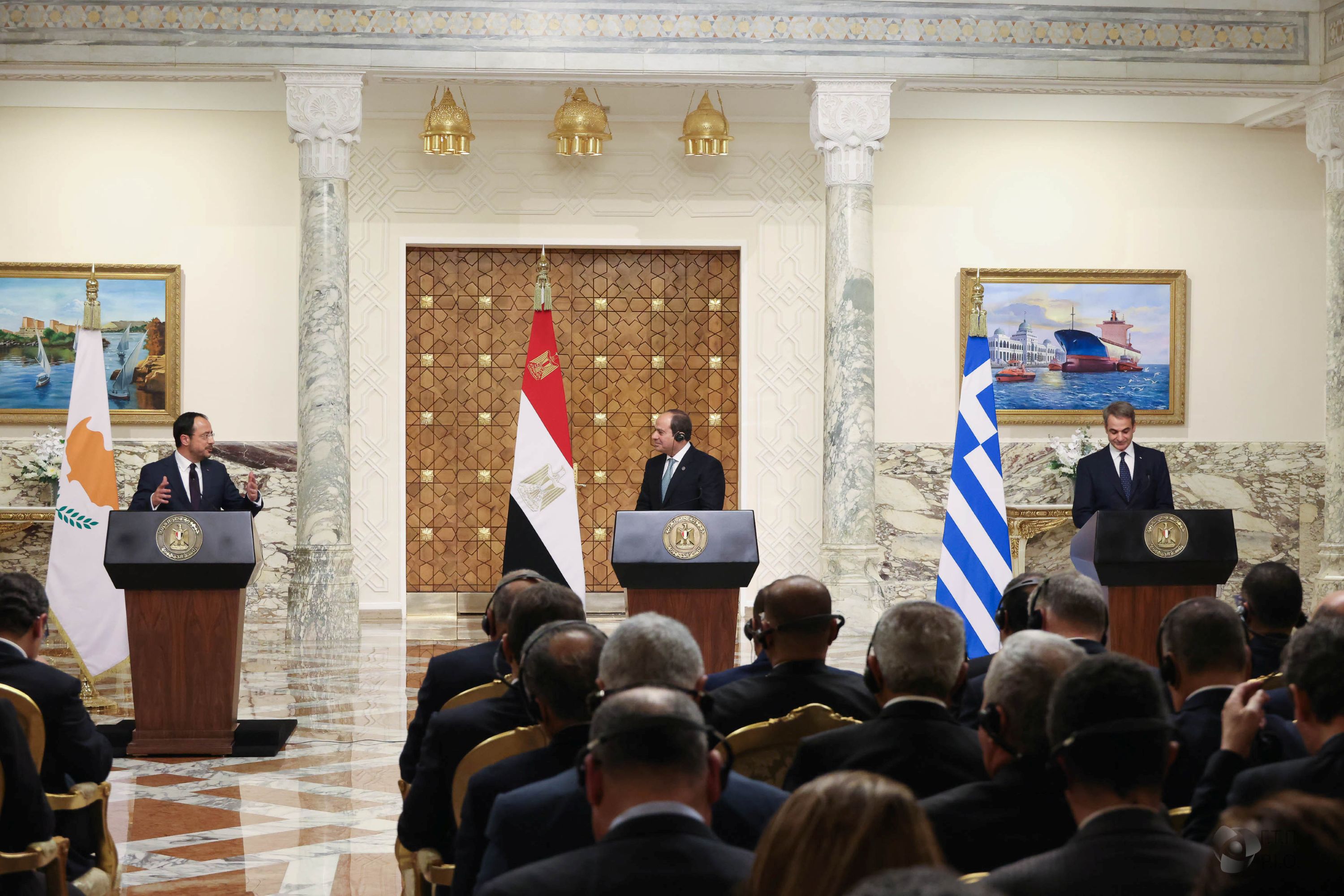President Nikos Christodoulides on Wednesday said Cyprus’ trilateral cooperation with Egypt and Greece has as one of its main objectives “the promotion of peace and stability in the region”.
Speaking after the day’s trilateral meeting with Egyptian President Abdel Fattah al-Sisi and Greek Prime Minister Kyriakos Mitsotakis in Cairo, he said a “very important part” of their meeting had concerned regional developments.
Cyprus’ neighbourhood, he said, is “in a very difficult situation which cannot cause us anything but great concern”.
“This is a state of affairs which comes into direct conflict with the vision that our three countries have for a peaceful and stable Eastern Mediterranean and wider Middle East,” he said.
He added that conflicts in Syria, Lebanon, Sudan, Libya, Yemen, the Red Sea and the “condemnable things” which are ongoing in Gaza have “contribute to an unprecedented cluster of crises which constitute a threat to international peace and security and require a collective response”.
“Amidst these developments, our trilateral cooperation is gaining even greater importance,” he said, adding that the countries’ relationship constitutes a “continuous strategic cooperation which has as one of its main objectives the broader promotion of peace and stability in the region”.
He added that all three countries reject any interventions made by states in other states and the violation of their sovereignty and territorial integrity.
“Our goal is the immediate cessation of hostilities, the de-escalation of tensions, and the peaceful resolution of all disputes on the basis of international law,” he said.
He then singled out Egypt and the “important role” the country has to play in regional developments, saying the country is “emerging as a key pillar of stability in a region of particular geostrategic importance, not only for the countries of the region but also for Europe, and more generally for everyone”.
To this end, he said he was “satisfied” at the substantial upgrade of relations between the European Union and Egypt, saying that a significant number of EU member states are now embracing better relations with the country.
He pointed out the signing of a strategic partnership between Egypt and the EU in March, and the creation of a support package for the country by the European Commission, saying those two acts constitute a “recognition that the security and stability of Europe and Egypt are interlinked”.
He said Cyprus has set as its “firm goal” the further strengthening of relations between Egypt and the EU, especially in light of Cyprus undertaking the European Council’s rotating presidency in the first half of next year.
He then delved into specific policy sectors, saying the two countries have a clear common approach on the matter of cooperation in the energy sector.
Sisi also spoke after the summit, expressing his satisfaction with the memorandums of understanding signed both bilaterally with Cyprus and on a trilateral basis with both Cyprus and Greece.
Cyprus and Egypt signed memorandums on matters including information technology and on early warning of nuclear accidents, while trilateral memorandums were also signed on matters including water resources, investment relations and port development.
Sisi added that Cyprus and Egypt had on Wednesday “underlined our common commitment to strengthening regional stability as well as our bilateral relations in all areas of common interest”.
“I am pleased to note tangible progress in a number of areas between Cyprus and Egypt, including in maritime security, natural resources in the Mediterranean, education, technology and scientific research,” he said.
Mitsotakis described trilateral relations with Cyprus and Egypt as “extremely resilient and productive”, while also saying the three countries “share the prospects for the future of our wider neighbourhood by jointly building peace, stability, and cooperation, but also by repelling any action outside the framework of international legitimacy”.
He also called for an inclusive process in Syria following the fall of the country’s former dictator Bashar al-Assad, and said the country’s new leadership must protect the rights of minorities and “avoid a resurgence of conflicts … which could hinder the voluntary, safe return of refugees” to the country.
“We are committed to intensifying our efforts to normalise the situation,” he added, saying that these efforts “go through international law, which all three countries respect”.






Click here to change your cookie preferences